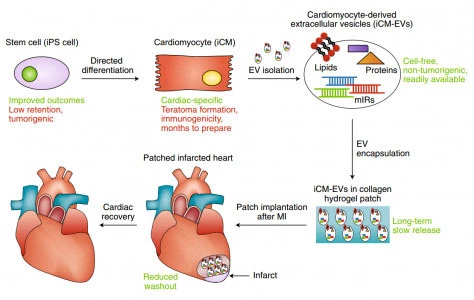Study found that isolated exosomes (iPSC-EVs) can improve cardiac recovery after myocardial infarction in rats

Study found that isolated exosomes (iPSC-EVs) can improve cardiac recovery after myocardial infarction in rats

Copyright © iCell Bioscience Inc, Shanghai 2018-2019
Myocardial infarction (MI) is based on coronary artery disease. Coronary blood supply is rapidly reduced or interrupted, causing severe and persistent acute ischemic necrosis of the corresponding myocardium. Sudden clinical manifestations, severe and persistent back pain in the chest, characteristic changes in electrocardiogram dynamics and increased serum enzymes, complications such as arrhythmia, heart failure, and shock can occur, often life-threatening, and the vast majority of human heart muscle, the symptoms of infarction are chest pain and chest tightness.
Myocardial infarction can be improved under pharmacological and surgical interventions, but its damaged tissue function cannot be restored. Middle-aged men between the ages of 45 and 60 are at high risk of myocardial infarction. Researchers have tried to deliver stem cells or cardiomyocytes to the injured heart, but they often cause arrhythmias and have unsatisfactory results.
Recently, a recent study from Columbia University described a cell-free therapy that improves myocardial function in rats by delivering exosomes (iPSC-EVs) isolated from human induced pluripotent stem cell differentiated cardiomyocytes (iPS-CM). After the infarction, the heart recovers and the function of the damaged heart is significantly restored.

The researchers packaged iPS-EVs and iCM-EVs into hydrogel patches and placed them on post-MI rat myocardium. Two weeks after myocardial infarction, iCM-EVs reduced cardiac dilation and improved function compared with untreated and iPS-EVs. In addition, at 4 weeks after MI, delivery of iCM-EVs significantly reduced infarct size and cardiomyocyte hypertrophy compared to untreated and iPS-EVs treatments.
iCM-EVs did not cause arrhythmias and reduced apoptosis in damaged hearts. The researchers speculate that iCM, unlike undifferentiated iPS cells, secretes exosomes carrying CM-specific components that can target the myocardium, thereby exerting cardioprotective functions and promoting recovery after myocardial infarction.
Purified exosomes from iCMs provide a cell-free method for the delivery of cardiac-specific biomolecules to injured tissue, allowing long-term release of molecules into the environment in collagen-based hydrogel patches, greatly simplifying Application methods also improve security.
 Loading ....
Loading ....
